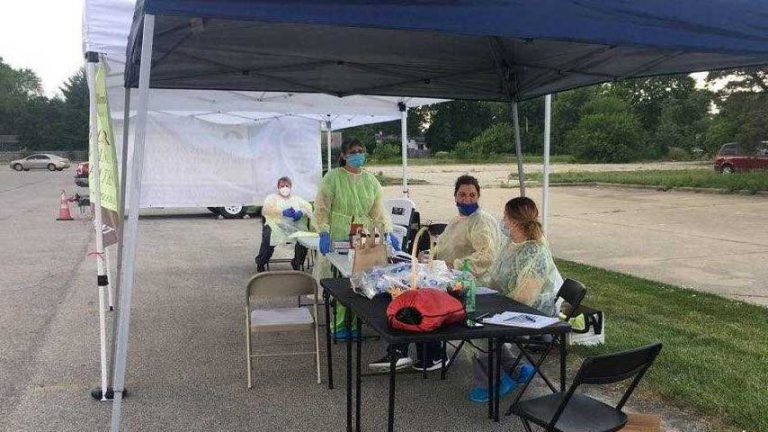CHICAGO – The U.S. food supply depends on millions of migrant and seasonal farmworkers, who are particularly vulnerable to COVID-19 because of circumstances in which they live and work. Outbreaks of COVID-19 on farms have killed more than a dozen farmworkers nationwide, and infected thousands more, according to tracking from the Food and Environment Reporting Network.
It’s unclear how many migrant workers have been tested for the coronavirus in Illinois, because the state does not track that data.
But at least 100 migrant workers in northern Illinois had tested positive by early July, and since then, dozens more have been identified across the state through mobile testing sites.
While state and federal guidelines offer steps employers should take to mitigate the spread of the virus, companies and growers aren’t required to provide or pay for coronavirus testing. An investigation from the Midwest Center and Illinois Newsroom found that among a 70-member crew in Rantoul, Ill., at least eight migrant farmworkers infected with the virus waited several days before isolating because the seed company they worked for declined to pay for expedited tests, according to emails obtained by the Brown Institute’s Documenting COVID-19 project.
In the absence of testing requirements, federally funded clinics have partnered with the state’s public health department to try to increase workers’ access to coronavirus tests.
The Community Health Partnership of Illinois operates migrant clinics that provide primary care services at several locations in central and northern Illinois.
In a typical year, the clinics do outreach and provide health screenings to migrant and seasonal farmworkers and their families. Since the start of the COVID-19 pandemic, they’ve added coronavirus testing to the list of services offered, partnering with the state’s public health department to set up mobile COVID-19 testing sites.
While the testing is offered free of charge, some companies aren’t willing to help their workers get tested, says Eleace Sawyers, CEO of the Community Health Partnership, which is based in Chicago.
“Sometimes we don’t get the permission to come in. Sometimes even when we get to a location, we are not allowed to test, sometimes things change,” Sawyers says. “So we’re working nationally, we’re working statewide to make sure everyone understands what our aims are so we can collaborate better.”
About 14% of the roughly 1,700 COVID-19 tests conducted by the Community Health Partnership since the start of the pandemic have been positive, she says.
Illinois Newsroom spoke with Sawyers about how COVID-19 testing efforts are going — and what’s on the horizon.
This interview has been lightly edited and condensed for length and clarity.
Christine Herman: How have the outreach and testing efforts been going?
Eleace Sawyers: We continue to test as much as we are able to. Sometimes we do have on a schedule, locations that we need to visit, and then things change.
Right now we have a shortage of outreach teams. We’re doing the best that we can in the community.
CH: Are you targeting hotels and places where migrant workers are staying or are you also trying to coordinate with growers to come to the field sites where the workers are working?
ES: We target everywhere farmworkers are. We try our best to identify when they’re coming in, where they’re housed, where they work, develop relationship with the workers, the growers, the plants.
Depending on where they give us permission, we’re constantly asking and letting them know that we’re here and we now provide COVID-19 testing. So where we have successes, we take them, and we try to also make sure the messaging goes out about the successes that we’re having, so (others) will also join on as well.
CH: And when you say that there’s been a bit of a staffing shortage, is that because you’re trying to ramp up and do even more outreach than usual because of the pandemic and the elevated need for these types of services for farmworkers?
ES: Absolutely. So we are funded by the federal government, quite a few dollars came down the pipeline to do testing. We accepted those dollars and we’re trying to make sure we hire quickly.
There are lots of challenges. Can you get the stuff in as quickly as you get the dollars in to hire? Can you get to the location? Can you get the numbers of locations? Can you get the information as to where your H2A workers and your other migrant farmworkers are? Can you get access to do the testing?
We learned of COVID-19, or more of it, within the last six months. How long does it take to even hire the staffing that you need to get the numbers of staff out there?
So we’ve been really working collaboratively with state agencies, we’re looking at funding sources everywhere. We’re seeking volunteers as well. We’re looking at health departments that we can partner with.
And then you have the challenge of even our staff. There is a fear going out there to test. We have a shortage of staff when we pull from our clinics to go into the community to test. So (there are) challenges.
CH: Do you wish that the testing was mandated for farmworkers, that it was required that employers provide it?
ES: That’s a beautiful thing, we’ve had that conversation. We think it is a good thing to test before entry, that’s a preventive measure in itself. Absolutely.
So, as much as the state requirements and the guidance will be moving forward — I’m on many committees having the conversation — but I think it is the right thing to do.
Christine Herman is a reporter at Illinois Public Media. Follow her on Twitter: @CTHerman

